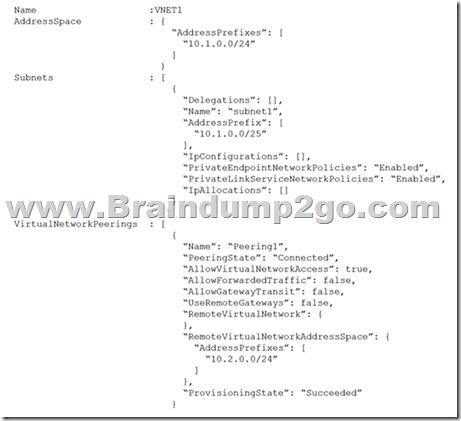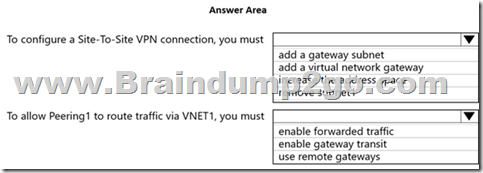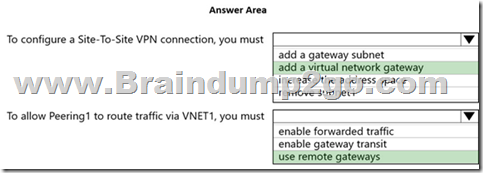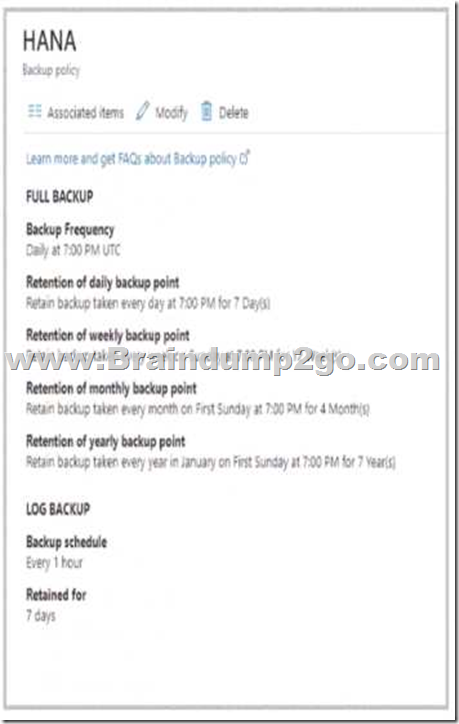April/2022 Latest Braindump2go AZ-120 Exam Dumps with PDF and VCE Free Updated Today! Following are some new AZ-120 Real Ezxam Questions!
QUESTION 150
Hotspot Question
You have an on-premises SAP landscape and an Azure subscription that contains a virtual network named VNET1. VNET1 has the following settings.

You plan to migrate the landscape to Azure.
You need to configure VNET1 to support the SAP landscape.
Use the drop-down menus to select the answer choice that completes each statement based on the information presented in the settings.
NOTE: Each correct selection is worth one point.

Answer:

Explanation:
Box 1: add a virtual network gateway
Box 2: use remote gateways
Each virtual network, regardless of whether peered with another virtual network, can still have its own gateway to connect to an on-premises network. When you peer virtual networks, you can also configure the gateway in the peered virtual network as a transit point to an on-premises network. In this case, the virtual network that uses a remote gateway cannot have its own gateway. A virtual network can have only one gateway that can be either a local or remote gateway (in the peered virtual network).
Reference:
https://docs.microsoft.com/en-us/azure/virtual-network/virtual-network-peering-overview
QUESTION 151
You have an on-premises SAP NetWeaver deployment that uses Windows Server 2016 and Microsoft SQL Server 2016.
You need to migrate the deployment to an Azure virtual machine that runs Windows Server 2016 and has Microsoft SQL Server 2019 installed.
Which migration method should you use?
A. heterogeneous SAP classical migration
B. classical SAP Database Migration Option (DMO)
C. lift-and-shift
D. Azure Migrate
Answer: B
QUESTION 152
You plan to deploy an SAP production landscape that uses SAP HANA databases on Azure.
You need to configure the storage infrastructure to support the SAP HANA deployment.
The solution must meet the SAP issued requirements for data throughput and I/O.
How should you configure the storage?
A. RAID1
B. RAID5
C. RAID0
D. RAID6
Answer: B
QUESTION 153
You plan to automate a deployment of SAP NetWeave on Azure virtual machines by using Azure Resource Manager templates. The database tier will consist of two instances of an Azure Marketplace Microsoft SQL Server 2017 virtual machine image that each has 8 TB of RAM.
Which task should you include in the templates used to deploy the SQL Server virtual machines?
A. Enable buffer pool extensions in SQL Server.
B. Enable read caching on the disks used to store the SQL Server database log files.
C. Run the SQL Server setup and specify the /ACTION=REBUILDDATABASE and /SQLCOLLATION switches.
D. Run the SQL Server setup and specify the /ACTION-INSTALL and /SQLMAXMEMORY switches.
Answer: D
QUESTION 154
Hotspot Question
You plan to deploy a scale-out SAP HANA deployment on Azure virtual machines that will contain a standby node.
You need to recommend a storage solution for the deployment.
What should you recommend? To answer, select the appropriate options in the answer area.
NOTE: Each correct selection is worth one point
Answer:

QUESTION 155
You have an on-premises deployment of SAP on DB2.
You plan to migrate the deployment to Azure and Microsoft SQL Server 2017.
What should you use to migrate the deployment?
A. SQL Server Migration Assistant (SSMA)
B. Azure SQL Data Sync
C. db2haicu
D. DSN1COPY
Answer: A
QUESTION 156
You have an Azure subscription. The subscription contains a virtual machine named VM1 that runs SAP HANA and a user named User1. User1 is assigned the Virtual Machine Contributor role of VM1. You need to prevent User1 from placing VM1 in the Stopped (deallocated) state. User1 must be able to restart the operating system on VM1.
What should you do?
A. Assign an Azure Policy definition to the resource group that contains VM1.
B. Create a resource lock on VM1.
C. Configure the Desired State Configuration (DSC) extension on VM1.
D. Assign User1 the Virtual Machine User Login rote for VM1.
Answer: C
QUESTION 157
You have an on-premises SAP production landscape.
You plan to migrate to SAP on Azure.
You need to generate an SAP Early Watch Alert report.
What should you use?
A. Azure Advisor
B. SAP HANA Cockpit
C. SAP Software Provisioning Manager
D. SAP Solution Manager
Answer: D
QUESTION 158
Hotspot Question
You have an existing on-premises SAP landscape that is hosted on VMware VSphere.
You plan to migrate the landscape to Azure.
You configure the Azure Site Recovery replication policy shown in the following exhibit.
What should you do? To answer, select the appropriate options in the answer area.

Answer:

QUESTION 159
You plan to deploy an SAP production landscape on Azure. You need to minimize latency between SAP HANA database servers and SAP NetWeaver servers.
What should you implement?
A. Azure Private Link
B. an Availability Set
C. a proximity placement group
D. a virtual machine scale set
Answer: C
QUESTION 160
Hotspot Question
You are planning an SAP NetWeaver deployment on Azure. The database her will consist of Two Azure virtual machines that have Microsoft SQL Server 2017 installed. Each virtual machine will be deployed to a separate availability zone.
You need to perform the following:
– Minimize network latency between the virtual machines.
– Measure network latency between the virtual machines.
To answer, select the appropriate options in the answer area.
Answer:

QUESTION 161
You have an SAP HANA on Azure (Large Instances) deployment.
You need to generate hearth check log files for the Deployment.
What should you do?
A. From a SSH session on the HANA Large instance node.
Run/var/waagent/Microsoft.AzureCAT.AzureEnhancedMonitoring.MonitorX64Linux-1.0.082/AzuredMonitoring monitoring.
B. From the Azure portal, select New support request.
C. From A SSH session on the HANA large instances node, run/opt/sgi/health_check/microsoft_tdi- sh.
D. From the Azure portal, select Diagnose and solve problems.
Answer: C
QUESTION 162
You deploy an SAP landscape on Azure.
You plan to use an Azure Automation account to stop the SAP virtual machines outside of business hours.
You need to ensure that you can use Azure Automation runbook a for the virtual machines.
What does the Azure Automation account require?
A. an Azure Storage account
B. an Azure App Service WebJob
C. a Recovery Services vault
D. a Run As account
Answer: B
QUESTION 163
You have an SAP production landscape that uses SAP HANA databases on Azure.
The HANA database server is a Standard.M32ms Azure virtual machine that has 864 GB of RAM.
The HANA database is 400 GB. You expect the database to grow by 40 percent during the next 12 months.
You resize the HANA database server virtual machine to Standard_m64ms and ,024 GB of RAM.
You need to recommend additional changes to minimize performance degradation caused by database growth
What should you recommend for the HANA database server?
A. Increase the number of vCPUs.
B. Configure additional disks
C. Add a secondary network interface.
D. Add a scale out node.
Answer: A
QUESTION 164
You are planning a highly available SAP HANA deployment on Azure virtual machines.
You need to recommend a solution for monitoring TCP latency between the SAP application and the database tiers on the TCP socket layer.
What should you include in the recommendation?
A. the Azure Network Watcher reachability report
B. Azure Extension for SAP
C. the NIPING command
D. the PING command
Answer: A
QUESTION 165
Hotspot Question
You are implementing a highly available deployment of SAP HANA on Azure virtual machines.
You need to ensure that the deployment meets the following requirements:
– Supports host auto-failover
– Minimizes cost
How should you configure the highly available components of the deployment? To answer, select the appropriate options in the answer area. NOTE: Each correct selection is worth one point.
Answer:

QUESTION 166
You have an SAP production landscape that uses SAP HANA databases on Azure.
You need to deploy a disaster recovery solution to the SAP HANA databases.
The solution must meet the following requirements:
– Support failover between Azure regions.
– Minimize data loss in the event of a failover.
What should you deploy?
A. Azure Site Recovery
B. Always On availability group
C. HANA system replication that uses asynchronous replication
D. HANA system replication that uses synchronous replication
Answer: C
QUESTION 167
Hotspot Question
You have a Recovery Services vault backup policy for SAP HANA on an Azure virtual machine as shown in the following exhibit.

Use the drop-down menus to select the answer choice that completes each statement based on the information presented in the graphic.
NOTE: Each correct selection is worth one point.
Answer:

QUESTION 168
You have an SAP landscape on Azure that contains the virtual machines shown in the following table.

You need to ensure that the Application Server role is available if a single Azure datacenter fails.
What should you include in the solution?
A. Azure Private Link
B. Azure Load Balancer Standard
C. a local network gateway
D. Azure Application Gateway v1
Answer: D
QUESTION 169
Hotspot Question
You plan to migrate an SAP database from Oracle to Microsoft SQL Server by using the SQL Server Migration Assistant (SSMA).
You are configuring a Proof of Concept (PoC) for the database migration.
You plan to perform the migration multiple times as part of the PoC.
You need to ensure that you can perform the migrations as quickly as possible. The solution must ensure that all Oracle schemas are migrated.
Which migration method and migration mode should you use? To answer, select the appropriate options in the answer area. NOTE: Each correct selection is worth one point.
Answer:

QUESTION 170
Drag and Drop Question
You plan to deploy SAP HANA to an Azure virtual machine that has a constrained vCPU size.
You need to validate that the virtual machine complies with SAP-defined resource requirements by using the SAP HANA Hardware and Cloud Measurement Tools (HCMT).
In which order should you perform the actions? To answer, move all actions from the list of actions to the answer area and arrange them in the correct order.
Answer:

Resources From:
1.2022 Latest Braindump2go AZ-120 Exam Dumps (PDF & VCE) Free Share:
https://www.braindump2go.com/az-120.html
2.2022 Latest Braindump2go AZ-120 PDF and AZ-120 VCE Dumps Free Share:
https://drive.google.com/drive/folders/1JuZJRLXeRZjvEVqjZxKg_QSRXuzFBnsu?usp=sharing
3.2021 Free Braindump2go AZ-120 Exam Questions Download:
https://www.braindump2go.com/free-online-pdf/AZ-120-PDF-Dumps(89-119).pdf
https://www.braindump2go.com/free-online-pdf/AZ-120-VCE-Dumps(120-150).pdf
Free Resources from Braindump2go,We Devoted to Helping You 100% Pass All Exams!